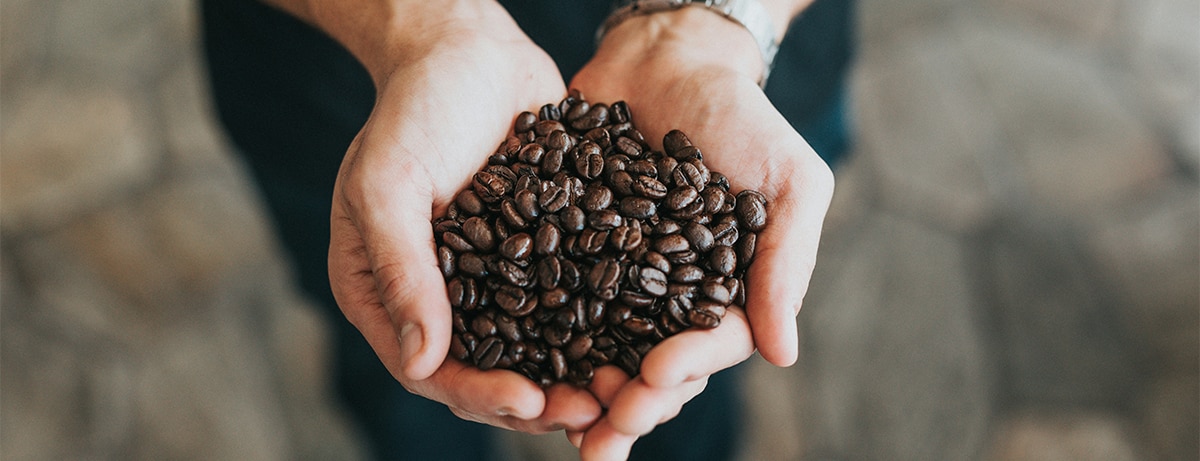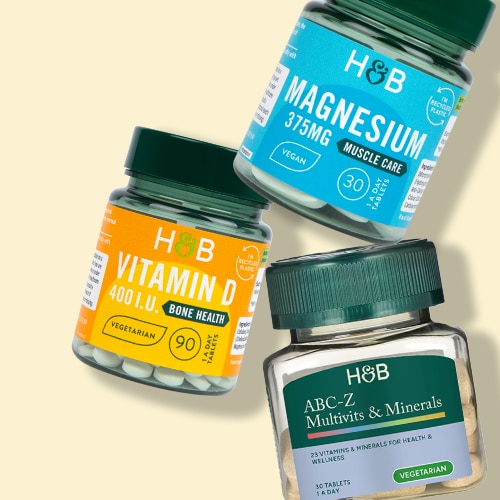15% off £25 or 20% off £35
Code:BASKET
Is caffeine bad for you? The truth behind your coffee fix

A cup of coffee, a mug of tea or an energy drink, getting your caffeine fix has never been easier – but how does this stimulant affect you and your body?
Summary
1What’s caffeine?
Caffeine is a naturally occurring stimulant found in plants like coffee beans, tea leaves and...
2How does caffeine actually work?
Caffeine works by blocking a substance called adenosine that’s partly responsible for making...
3How does caffeine affect your body?
Caffeine has a range of effects, with some research alluding to potential benefits. But...
Can’t start your day until you’ve had your cup of coffee? Or maybe you rely on a post-lunch energy drink. We get it.
Caffeine is a daily essential for many of us, but beyond the initial buzz it gives, what do you really know about it? Here, we’re spilling the beans on all things caffeine, including how it works, how it affects you and some easy tips to manage your consumption.
What's caffeine?
Caffeine is the world’s most popular psychoactive substance.1
Yep, you read that right, but don’t be alarmed. It’s a naturally occurring chemical compound found in the fruit, leaves and beans of certain plants like coffee beans, tea leaves (green, black, white and oolong), cacao beans (the base for chocolate), guarana, yerba mate and kola nuts.2
In our day-to-day lives, it can be found in all sorts of drinks and food items, including coffee and tea, fizzy drinks, energy drinks and chocolate.2 It can also be found in energy supplements and some medications, such as cold and flu remedies.2
How does caffeine work?
Caffeine works primarily by blocking a natural chemical in your body called adenosine. Adenosine is the substance that controls feelings of tiredness, and it builds up in your central nervous system throughout the day, leaving you feeling tired and helping you fall asleep at night.3
But when you consume something that has caffeine in it, your liver breaks it down to release stimulating chemicals, which are quickly absorbed into your bloodstream.3,4
The caffeine then blocks adenosine from doing its job, by binding to adenosine receptors in the brain.5 If less adenosine can bind to these receptors, your brain doesn’t get the ‘tired’ signal as strongly, often leaving you feeling a bit more alert, focused and awake.6
The good and the bad: the effects of caffeine on the body

From your mind to your workouts, the potential benefits of your daily cup of joe are vast. But, while a coffee or energy drink might be a much-needed part of your morning routine, it’s also worth understanding the potential downsides, especially if you’re sensitive to its effects.
Ongoing research continues to explore the role of caffeine. While current findings are still limited, emerging evidence suggests some potential benefits including:
- Alertness and focus: perhaps caffeine's most celebrated effect, it can increase your attention and help you feel more awake5
- Cognitive function: beyond just alertness, emerging evidence suggests caffeine could improve memory consolidation7
- Physical performance: for those who hit the gym or even just love a long walk, caffeine could be part of your daily activities. It can make exercise feel less strenuous, and may even contribute to increased strength and performance3
- Your mood: feeling a bit sluggish? Caffeine may temporarily support your mood and reduce feelings of fatigue8
- Sleep disruption: caffeine can linger in your system for hours due to its half-life, meaning that even if you have it in the afternoon, it could still be actively interfering with your sleep patterns later that night9,10
- The jitters: too much caffeine can be overstimulating, leading to feelings of nervousness, restlessness and even heightened anxiety 11,12
- Increased heart rate and blood pressure: caffeine can cause a temporary elevation in your heart rate and blood pressure – it’s usually mild and fleeting, but it's more noticeable for those who are sensitive or have existing heart conditions13,14
- Tummy troubles: your stomach might not always appreciate caffeine, and it can potentially lead to stomach upset, acid reflux or even an increase in bowel movements15
- Too much caffeine: while rare, it's possible to consume too much caffeine, leading to caffeine toxicity, so it’s really important to have it in moderation16
How much caffeine is too much?
When it comes to caffeine, moderation is key! A general guideline is to stick to around 400 milligrams per day and to have it earlier in the day to stop it interrupting your sleep.17
But how much caffeine is in coffee? And what about other drinks or foods containing caffeine?
While each product will vary in their caffeine strengths, here’s a quick guide to help you keep track:18
- mug of instant coffee – 100mg
- mug of filter coffee – 140mg
- a shot of espresso – 80mg
- mug of tea – 75mg
- 250ml can of cola – 40mg
- can of energy drink – 80mg
- 50g of plain dark chocolate – less than 25mg
- 50g of plain milk chocolate – less than 10mg
Keep in mind too that although ‘decaffeinated’ versions of most drinks are available, most may still contain small amounts of caffeine.19 Plus, it’s important to remember that everyone reacts differently to caffeine, whether it’s thanks to genetics, how fast your body can break it down or other personal characteristics.
Who should avoid caffeine?
Caffeine is safe for most adults to have in moderation, but there are exceptions.
If you’re pregnant or breastfeeding, it’s advised by the NHS that you limit your caffeine intake to a maximum of 200mg a day, as regularly drinking more than this may increase your risk of pregnancy complications.20 However, it’s still generally advised to avoid caffeine during pregnancy.21
If you’re worried about how caffeine may interact with any medications or affect a medical condition, we recommend speaking to your GP for personalised advice.
6 tips for healthy caffeine consumption
- Timing is key: try to avoid caffeinated drinks at least six hours before you plan to go to sleep to help avoid a restless night11
- Water intake: for every cup of tea or coffee, try to drink a glass of water to stay hydrated
- Listen to your body: caffeine affects everyone differently, so pay attention to how it makes you feel
- Gradual reduction: if you’re looking to cut back, do so gradually to help prevent any withdrawal symptoms
- Combine with healthy habits: caffeine is no substitute for good sleep, a balanced diet and regular exercise
- Go for decaf: craving the taste of coffee in the afternoon, but don’t want the caffeine buzz? Switch it up and try decaf
The final say
Whether you love having a coffee in the morning or rely on energy drinks to get you through your night shift, remember that moderation is key. Aim to have no more than 400mg a day and we’re sure you’ll be able to keep your caffeine habit a safe one.22
Looking to add a little pep in your step? Check out our guide to avoiding an afternoon energy slump, or discover some surprising causes of low energy and find ways to keep those unwanted yawns at bay.
The advice in this article is for information only and shouldn’t replace medical care. Please check with your GP or healthcare professional before trying any supplements, treatments or remedies. Food supplements must not be used as a substitute for a varied and balanced diet and a healthy lifestyle.
1. Evans J, Richards JR, Battisti AS. Caffeine [Internet]. Nih.gov. StatPearls Publishing; 2024 [cited 2025 Jul 17]. Available from: https://www.ncbi.nlm.nih.gov/books/NBK519490/
2. Caffeine [Internet]. Nih.gov. International Agency for Research on Cancer; 2025 [cited 2025 Jul 22]. Available from: https://www.ncbi.nlm.nih.gov/books/NBK507027/
3. Guest NS, VanDusseldorp TA, Nelson MT, Grgic J, Schoenfeld BJ, Nathaniel, et al. International society of sports nutrition position stand: caffeine and exercise performance. Journal of the International Society of Sports Nutrition [Internet]. 2021 Jan 2 [cited 2025 Jul 22];18(1). Available from: https://pubmed.ncbi.nlm.nih.gov/33388079/
4. Janisa Andrea Muljadi, Patsorn Kaewphongsri, Kornkit Chaijenkij, Jatupon Kongtharvonskul. Effect of caffeine on delayed-onset muscle soreness: a meta-analysis of RCT. Bulletin of the National Research Centre/Bulletin of the National Research Center [Internet]. 2021 Nov 18 [cited 2025 Jul 22];45(1). Available from: https://bnrc.springeropen.com/articles/10.1186/s42269-021-00660-5/
5. McLellan TM, Caldwell JA, Lieberman HR. A review of caffeine’s effects on cognitive, physical and occupational performance. Neuroscience & Biobehavioral Reviews [Internet]. 2016 Dec [cited 2025 Jul 22];71:294–312. Available from: https://www.sciencedirect.com/science/article/pii/S0149763416300690?via%3Dihub
6. Tired or Wired? [Internet]. NIH News in Health. 2024 [cited 2025 Jul 22]. Available from: https://newsinhealth.nih.gov/2020/10/tired-or-wired
7. Borota D, Murray E, Keceli G, Chang A, Watabe JM, Ly M, et al. Post-study caffeine administration enhances memory consolidation in humans. Nature Neuroscience [Internet]. 2014 Jan 12 [cited 2025 Aug 11];17(2):201–3. Available from: https://pmc.ncbi.nlm.nih.gov/articles/PMC5909971/
8. Hachenberger J, Li YM, Anu Realo, Sakari Lemola. The association of caffeine consumption with positive affect but not with negative affect changes across the day. Scientific Reports [Internet]. 2025 Aug 5 [cited 2025 Aug 11];15(1). Available from: https://www.nature.com/articles/s41598-025-14317-0
9. Gardiner C, Weakley J, Burke LM, Roach GD, Sargent C, Maniar N, et al. The effect of caffeine on subsequent sleep: A systematic review and meta-analysis. Sleep Medicine Reviews [Internet]. 2023 Feb 6 [cited 2025 Jul 22];69:101764–4. Available from: https://pubmed.ncbi.nlm.nih.gov/36870101/
10. Drake C, Roehrs T, Shambroom J, Roth T. Caffeine Effects on Sleep Taken 0, 3, or 6 Hours before Going to Bed. Journal of Clinical Sleep Medicine [Internet]. 2013 Nov 15 [cited 2025 Jul 22];09(11):1195–200. Available from: https://jcsm.aasm.org/doi/10.5664/jcsm.3170
11. Liu C, Wang L, Zhang C, Hu Z, Tang J, Xue J, et al. Caffeine intake and anxiety: a meta-analysis. Frontiers in Psychology [Internet]. 2024 Feb 1 [cited 2025 Jul 22];15. Available from: https://pmc.ncbi.nlm.nih.gov/articles/PMC10867825/
12. Klevebrant L, Frick A. Effects of caffeine on anxiety and panic attacks in patients with panic disorder: A systematic review and meta-analysis. General Hospital Psychiatry [Internet]. 2021 Dec 2 [cited 2025 Jul 22];74:22–31. Available from: https://pubmed.ncbi.nlm.nih.gov/34871964/
13. British Heart Foundation. How much caffeine [Internet]. British Heart Foundation. 2025 [cited 2025 Jul 22]. Available from: https://www.bhf.org.uk/informationsupport/heart-matters-magazine/nutrition/ask-the-expert/how-much-caffeine
14. Chronic High Caffeine Consumption Impacts Heart Rate, BP Post Activity, Heightens Risk For CVD - American College of Cardiology [Internet]. American College of Cardiology. 2025 [cited 2025 Jul 22]. Available from: https://www.acc.org/Latest-in-Cardiology/Articles/2024/08/14/16/39/Chronic-High-Caffeine-Consumption-Impacts-Heart-Rate-BP
15. Nehlig A. Effects of Coffee on the Gastro-Intestinal Tract: A Narrative Review and Literature Update. Nutrients [Internet]. 2022 Jan 17 [cited 2025 Jul 22];14(2):399. Available from: https://pmc.ncbi.nlm.nih.gov/articles/PMC8778943/
16. Murray A, Traylor J. Caffeine Toxicity [Internet]. Nih.gov. StatPearls Publishing; 2025 [cited 2025 Jul 22]. Available from: https://www.ncbi.nlm.nih.gov/books/NBK532910/
17. Caffeine [Internet]. European Food Safety Authority. 2015 [cited 2025 Jul 22]. Available from: https://www.efsa.europa.eu/en/topics/topic/caffeine
18. Spilling the Beans: How Much Caffeine is Too Much? [Internet]. U.S. Food and Drug Administration. 2024 [cited 2025 Jul 22]. Available from: https://www.fda.gov/consumers/consumer-updates/spilling-beans-how-much-caffeine-too-much?/
19. NHS website. High blood pressure [Internet]. nhs.uk. 2024 [cited 2025 Jul 22]. Available from: https://www.nhs.uk/conditions/high-blood-pressure/
20. NHS. Foods to avoid in pregnancy [Internet]. nhs.uk. 2020 [cited 2025 Jul 22]. Available from: https://www.nhs.uk/pregnancy/keeping-well/foods-to-avoid/
21. James JE. Maternal caffeine consumption and pregnancy outcomes: a narrative review with implications for advice to mothers and mothers-to-be. BMJ evidence-based medicine [Internet]. 2020 Aug 25 [cited 2025 Jul 22];26(3):114–5. Available from: https://ebm.bmj.com/content/26/3/114
22. Temple JL, Bernard C, Lipshultz SE, Czachor JD, Westphal JA, Mestre MA. The Safety of Ingested Caffeine: A Comprehensive Review. Frontiers in Psychiatry [Internet]. 2017 May 26 [cited 2025 Jul 22];8. Available from: https://pmc.ncbi.nlm.nih.gov/articles/PMC5445139/












